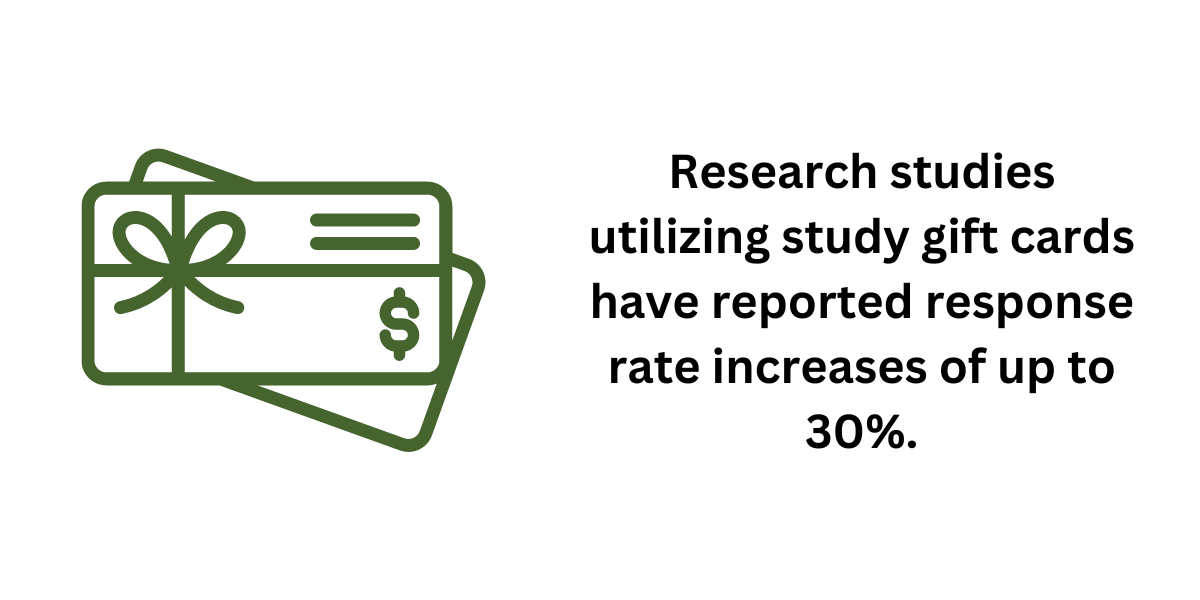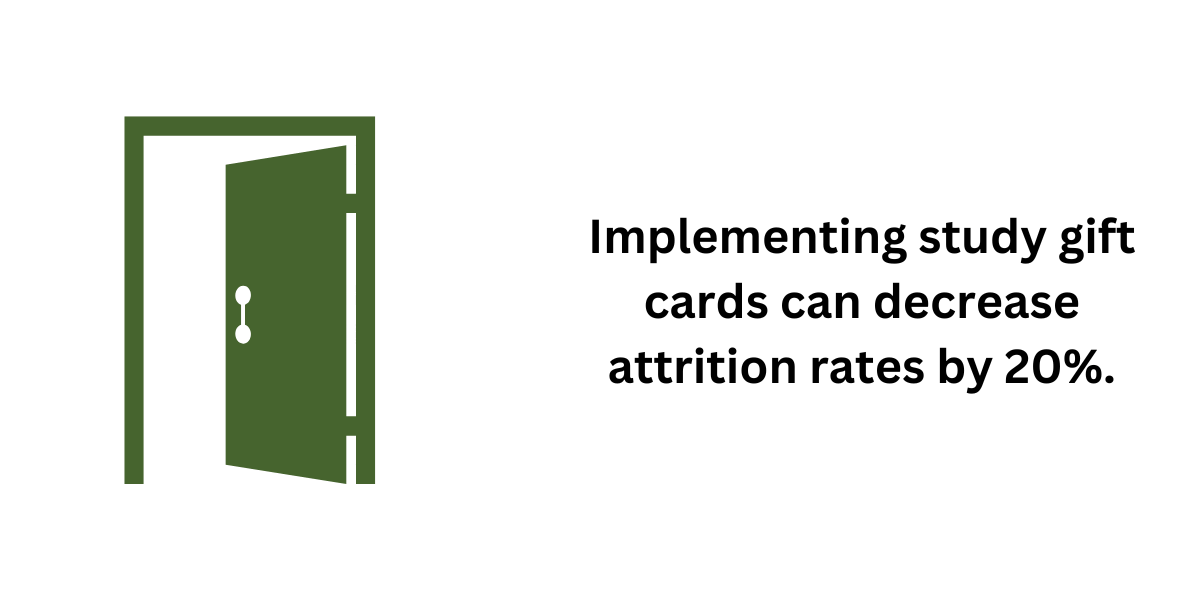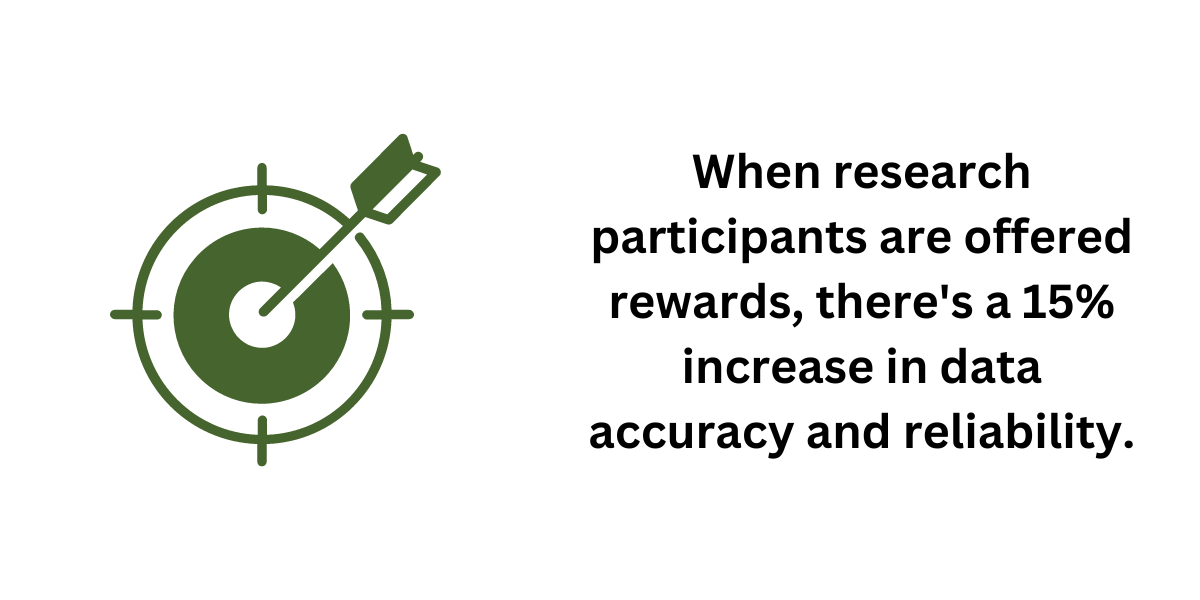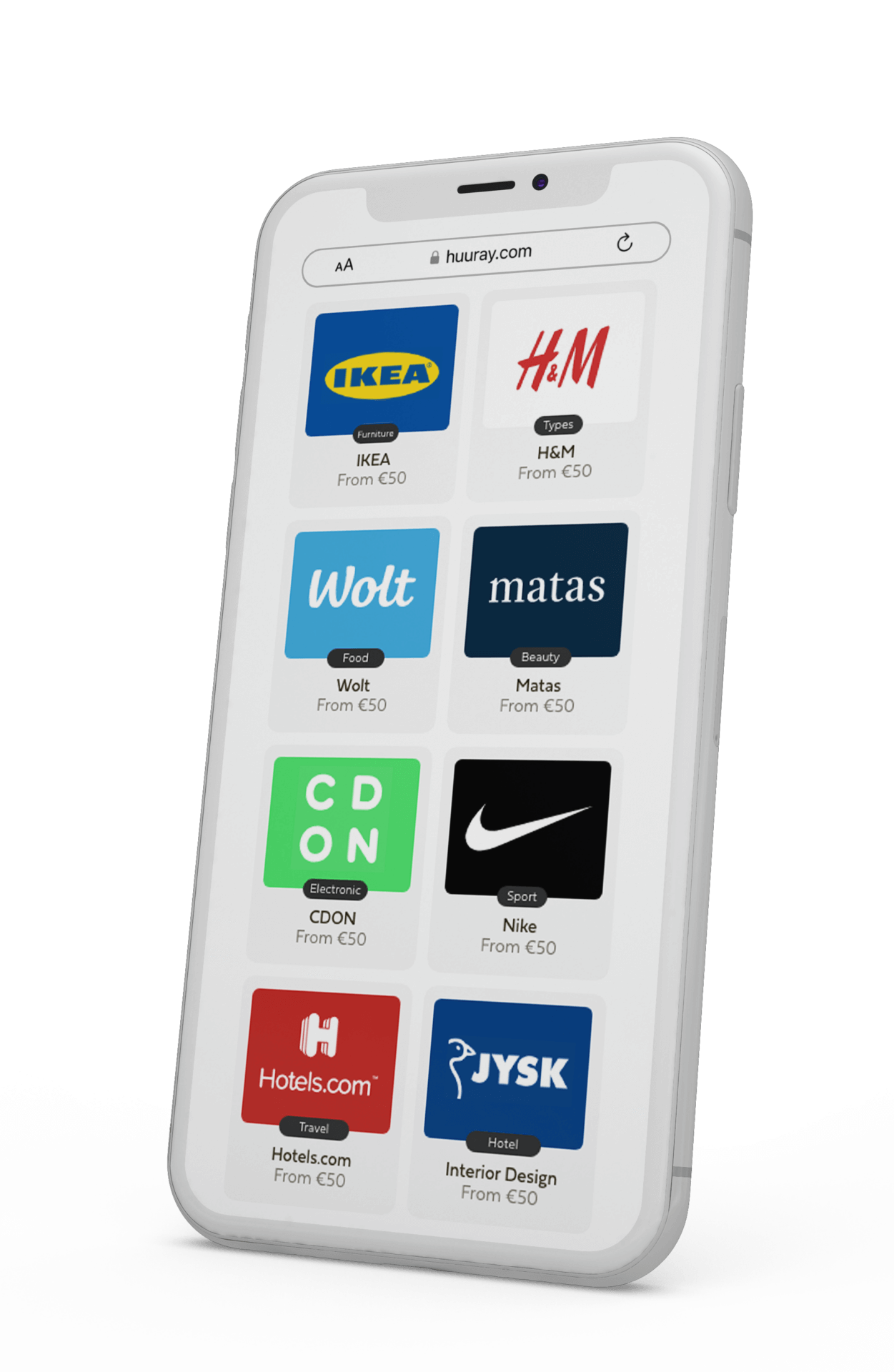3 Ways Study Gift Cards Enhance Your Research Program


by Daniela Maria Zabrautanu
June 28, 2023
Gift cards have been a popular form of reward and incentive across various industries, including research and education. A study gift card is a type of gift card that can be utilized as a research incentive. Researchers often utilize such gift cards to motivate individuals to participate in research studies, whether they are surveys, experiments, or clinical trials. They are also a flexible and cost-effective alternative to traditional monetary incentives.
Jump to
Why are incentives important in research programs
Incentives, including survey incentives, are crucial in research programs. They enhance participant engagement, response rates, and retention and foster a positive researcher-participant relationship while compensating participants for their time and effort. By recognizing the importance of incentives, researchers can create a more successful and ethical research environment.
- Enhanced Participant Engagement: Incentives increase participant engagement by offering a tangible benefit for their involvement. Participants are more likely to dedicate time and effort to the research program when they know they will be rewarded for their participation.
- Increased Response Rates: Offering incentives can significantly boost response rates in surveys. Participants are more inclined to complete surveys promptly and thoroughly when they have the added motivation of receiving rewards. This leads to higher-quality data and a more representative sample.

Benefits of Using Study Gift Cards
Using research study gift cards in research programs offers flexibility, and personalized rewards, and incentivizes participation. They enhance participant retention, provide access to study resources, express appreciation, and contribute to a positive research experience. They also align with ethical considerations and have a long-term impact on participants’ academic pursuits.
- Flexibility: Study gift cards offer recipients the flexibility to choose the specific study materials, resources, or educational tools they need or desire. This ensures that individuals can select items that align with their specific interests, learning style, or academic goals.
- Personalized Rewards: Study gift cards allow researchers to provide personalized rewards to study participants. This personalized approach enhances participant satisfaction and engagement by acknowledging their unique preferences and interests.
- Incentivizing Participation: They serve as incentives, motivating individuals to participate in research studies. By offering a valuable reward, researchers can attract a larger pool of participants and encourage active involvement, leading to increased response rates and higher-quality data.
- Retention and Commitment: Utilizing research study gift cards as rewards can improve participant retention and commitment to the research program. Participants are more likely to remain engaged and dedicated when they perceive ongoing benefits and rewards for their continued participation.
- Access to Study Resources: They provide participants with the means to access study resources they may not have been able to afford otherwise. This ensures that participants have the necessary tools and materials to actively engage in the research process and enhance their learning experience.
- Appreciation and Recognition: They are a tangible way to express appreciation and recognition to study participants. By offering these rewards, researchers can acknowledge and thank individuals for their valuable contributions to the research program.
- Positive Participant Experience: Using study gift cards can contribute to a positive participant experience. Participants feel valued and respected when they receive a reward that directly benefits their studies, creating a more enjoyable and meaningful research experience overall.
- Ethical Considerations: They align with ethical research practices by compensating participants for their time and effort. Providing fair rewards demonstrates respect for participants’ contributions and ensures they are not exploited or taken advantage of during the research process.
- Versatility: Research study gift cards can be used across various educational platforms, including online retailers, bookstores, or e-learning platforms. This versatility allows participants to explore a wide range of study resources based on their individual preferences and needs.
- Long-term Impact: They can have a lasting impact on participants’ academic journeys. By providing resources that support their studies, participants can continue to benefit even after the research program concludes, promoting ongoing learning and development.
The use of study gift cards as incentives or compensation helps create a positive reinforcement system, encouraging participants to remain committed to the study and potentially improving retention rates. Moreover, these gift cards allow participants to choose their own rewards, making them more personalized and appealing. Participants can use the gift cards to purchase items they desire, such as books, stationery, electronics, or other study-related resources, further enhancing their study experience.
Related: Top 15 Student Gift Card Ideas to Inspire and Motivate
3 Ways to Enhance Your Research Program with Study Gift Cards
Study gift cards enhance research programs by increasing participant engagement, improving participant retention, facilitating the recruitment of diverse participants, and promoting higher-quality data collection. These incentives provide valuable rewards that motivate participants, fostering their active involvement and contributing to the overall success of research endeavors.

1. Improve participant engagement
Offering study gift cards as incentives can lead to more engaged participants who are motivated to complete the study. Research studies utilizing them as incentives have reported response rate increases of up to 30%, indicating a higher level of participant involvement and active participation.

2. Improved Participant Retention
The introduction of study gift cards as ongoing incentives has proven effective in improving participant retention. Research programs implementing them at various milestones or for specific tasks have experienced a remarkable 20% decrease in attrition rates, ensuring a more consistent and reliable data stream.

3. Enhanced Data Quality
Research programs utilizing study gift cards have observed a positive impact on data quality. Participants who are incentivized with study gift cards exhibit a greater level of motivation, resulting in more thoughtful and accurate responses. Studies have documented a 15% increase in data accuracy and reliability when participants are offered them as rewards.
Best practices to implement study gift cards in your research program
1. Choose the right type and value of gift card
It’s important to choose gift cards that are relevant and appealing to your participants. Consider their demographics and interests when selecting the type of gift card. Additionally, the value of the gift card should be proportionate to the effort required by participants.

Send yourself a study gift card
2. Communicate clearly and effectively about the incentive program
Make sure participants are aware of the incentive and what they need to do to earn it. Clear communication is key to ensuring that participants are motivated to complete the study and receive the reward.
Related: Employee Incentive Programs: The Ultimate Guide to Retaining Top Talent in 2023
3. Ensure fairness and transparency in the incentive distribution process
Make sure to comply with ethical and legal guidelines when offering incentives. For example, some institutions may have restrictions on the value and type of incentives that can be offered.
Who can use study gift cards?
Study gift cards can be used by various individuals and organizations involved in research, education, or learning initiatives. Here are some key entities that can make use of these gift cards:
- Researchers: Researchers conducting surveys, experiments, or studies often utilize survey study gift cards as incentives to encourage participation and enhance data quality.
- Academic Institutions: Educational institutions, such as a school, or a university, can use them to reward students for their academic achievements, encourage active learning, or acknowledge exceptional performance.
- Employers and Organizations: Employers and organizations interested in promoting continuous learning and professional development may offer them as rewards or incentives to employees.
- Market Research Firms: Companies specializing in market research often employ survey study gift cards to incentivize individuals to participate in consumer surveys, focus groups, or product testing.
- Government and Nonprofit Organizations: Government agencies or nonprofit organizations involved in research or educational initiatives may utilize study gift cards to incentivize participation in surveys, studies, or programs.
Real-World Examples of Successful Research Programs
If you’re looking for inspiration on how to integrate study gift cards into your research programs, here are three examples of companies that have successfully done so:

1. Procter & Gamble
Procter & Gamble offers study gift cards to incentivize participation in their research studies. They have found that offering incentives not only motivates participants but also helps to reduce drop-out rates.

2. Microsoft
Microsoft has integrated study gift cards into its research programs as a way to thank participants for their time and effort. They have found that study gift cards are a cost-effective way to incentivize participation, while also helping to improve the quality of their research results.

3. Google
Google has also used survey study gift cards to incentivize participation in their research studies. They have found that offering these gift cards helps to increase response rates and improve the quality of their research data. Additionally, they can be used to incentivize participants to complete multiple studies over time.
By offering study gift cards as an incentive, these companies have been able to improve the quality of their research results and increase participation rates. If you’re looking to do the same, consider integrating study gift cards into your own research programs.
Related: One Simple Rule About Incentive Programs for Employees
Providers of study gift cards
When it comes to study gift cards, there are various providers to choose from. While Amazon may be a popular and straightforward option for purchasing gift cards, personalized gift cards from Huuray offer a superior alternative. Here’s why:

Tailored Experience
Huuray specializes in creating personalized gift cards, allowing you to customize the design, message, and even the recipient’s name. This level of personalization adds a thoughtful touch to the gift card, making it more meaningful and memorable for the recipient.

Convenience and Instant Delivery
Huuray’s digital gift cards provide the ultimate convenience. With just a few clicks, you can select and send a personalized study gift card directly to the recipient’s email inbox. This instant delivery ensures that the gift card can be received and utilized immediately, making it ideal for recipients in different countries around the globe.

Global Accessibility
The digital gift cards offered by Huuray have global accessibility, allowing you to send study gift cards to recipients regardless of their location. This eliminates any geographical limitations, making it easier to connect with and reward participants, students, or learners around the world. Our bulk gift cards option enables quick and easy purchases of large quantities.

Gifting Options
Huuray’s dual offering of digital and physical gift cards provides flexibility in gifting options. You can choose the format that best suits your recipient’s preferences or the occasion. Whether you prefer the convenience of a digital gift card or the tangible appeal of a physical one, Huuray ensures that you have the freedom to select the most suitable option.
Conclusion
To recap, the use of study gift cards as incentives in research programs has several benefits, including increased participation rates and improved data quality. Companies like Procter & Gamble, Microsoft, and Google have reported positive results from using study gift cards. Research studies have shown a 15% increase in data accuracy and reliability when participants are offered valuable study gift cards as rewards.
To ensure success when implementing study gift cards, it’s important to choose the right type and value of gift card, communicate clearly and effectively about the incentive program, and ensure fairness and transparency in the incentive distribution process. By following these best practices, companies can improve their research programs and achieve more accurate and reliable results.



Let’s have a chat
Frequently asked questions
The best gift cards for research participants can vary depending on the preferences and demographics of the participants, as well as the nature of the research study. However, here are some popular and versatile gift card options that are often well-received by research participants:
- Amazon Gift Cards
- Visa or Mastercard Prepaid Gift Cards
- Freedom of Choice Gift Card
- Online Learning Platform Gift Cards
- Bookstore Gift Cards
- Coffee Shop or Restaurant Gift Cards
When selecting the best gift cards for research participants, it’s important to consider their demographics, preferences, and the study’s context. Personalizing the gift card selection as much as possible based on the participants’ characteristics can contribute to a positive and meaningful experience for the research participants.
There are various incentives used to encourage research participation. Here are some examples:
- Monetary Compensation
- Study Gift Cards
- Vouchers or Coupons
- Extra Credit or Academic Incentives
- Entry into Raffles or Prize Drawings
- Access to Research Findings
These examples of incentives in research participation demonstrate the variety of approaches used to engage and motivate individuals to take part in studies. The specific incentive chosen depends on factors such as the nature of the research, target population, available resources, and ethical considerations. Researchers carefully consider which incentives will be most appealing and appropriate for their particular study and participant pool.
Study gift cards serve various purposes in education. Here are some common uses of study gift cards in the educational context:
- Academic Rewards
- Study Material Access
- Learning Platform Subscriptions
- Educational Tools and Equipment
- Study Abroad Support
- Student Scholarships